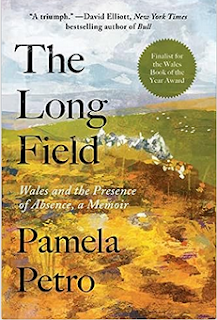Pamela Petro is the author of the new book The Long Field: Wales and the Presence of Absence, a Memoir. Her other books include Sitting Up with the Dead. She is co-director of the Dylan Thomas Summer School at the University of Wales, and she lives in Northampton, Massachusetts.
Q: What inspired you to write The Long Field, and how would you describe your relationship with Wales?
A: A great question. When I arrived in Wales at 23, as a young grad student, I experienced “cynefin”—a Welsh word meaning “to feel at home in a place that you may never have set foot in before.”
The treeless hills and far horizons gave me a sense of the way the earth had been formed, which I had never known in suburban New Jersey, where I’d grown up. I felt at home on the planet for the first time in my life.
And Wales’ marginality—as the first colony of the English empire—felt right too, as I’d grown up during the Vietnam War and Watergate, and felt wary of the center, at home on the edge. So did the fact that I suspected I might be gay. I’ve spent 40 years trying to understand all this. Wales has taught me nothing less than who I am and what it means to be home.
Q: How was the book's title chosen, and how would you define the term “hiraeth”?
A: Hiraeth has no cognate in English. It means something like a longing for an irretrievable place, person, or time—or perhaps for an imagined or idealized home, or a former version of yourself. An awareness of incompleteness in the immediate moment—of an insistent yearning. Call it an awareness of the presence of absence.
The term “long field” is one literal meaning of hiraeth: “a long, vast tract of land.” A short field is easily crossed; a long field separates me from that which I love. Hiraeth is the emotion of separation.
Q: The writer Mike Parker said of the book, “Both playful and serious, this memoir looks deep into the long field that separates and unites us, placing it squarely in a geography of love.” What do you think of that description?
A: Mike Parker’s lovely description makes great sense. In The Long Field I braid hiraeth I’ve experienced—as an American who pines for Wales, as a gay woman, as the survivor of a horrific Amtrak crash—into new and old hiraeth stories of Wales.
Along the way I write about hiraeth in some startlingly new ways: queer hiraeth, hiraeth trigged by politics, technology, ecological crises, immigration.
That said, while it’s a book about longing, it’s actually quite a cheerful book! My view of hiraeth evolves along the way from an awareness of loss and longing to a creative response to loss, which I see as the genius of Welsh culture—maybe the wellspring of all creativity.
It’s also a love story: my love of Wales, of my partner, Marguerite, and of my family, especially my parents.
Q: What impact did writing The Long Field have on you?
A: It made me tear my hair out by the roots! (Just kidding.)
Seriously, though, it took seven years to write, three different attempts at finding my way, nine agent rejections, and 19 publisher rejections. All of that taught me that when you heart dictates, “You must write this,” you put away your habitual impatience, take a deep breath, and allow the book to find its way in its own time. It taught me I have that patience.
And in trying to understand myself in light of my love for Wales—and articulate that understanding—I forced myself to become a better writer. It took seven years to grow into the person who could write this book.
Q: What are you working on now?
A: One of the subjects I discuss in TLF is our hiraeth for the megaliths—the Stone Age monuments that we admire but can never understand. They’re always in a long field of comprehension, just beyond our grasp: we, as people, have forgotten why our forebears put them there in the first place.
The megaliths drew me to rock art, and I’m thinking about that as the subject of a new book, especially rock art endangered by climate change, and rock art depicting female figures. It’s early stages, but I’m drawn by the mystery!
Q: Anything else we should know?
A: Just that I send my thanks for your interest! And that although The Long Field came out first in Britain, I actually wrote it for Americans, to introduce the idea of longing for an impossible home into the national conversation. As a nation of immigrants, always in search of our “deep homes,” hiraeth is a word we need to know…
--Interview with Deborah Kalb


No comments:
Post a Comment